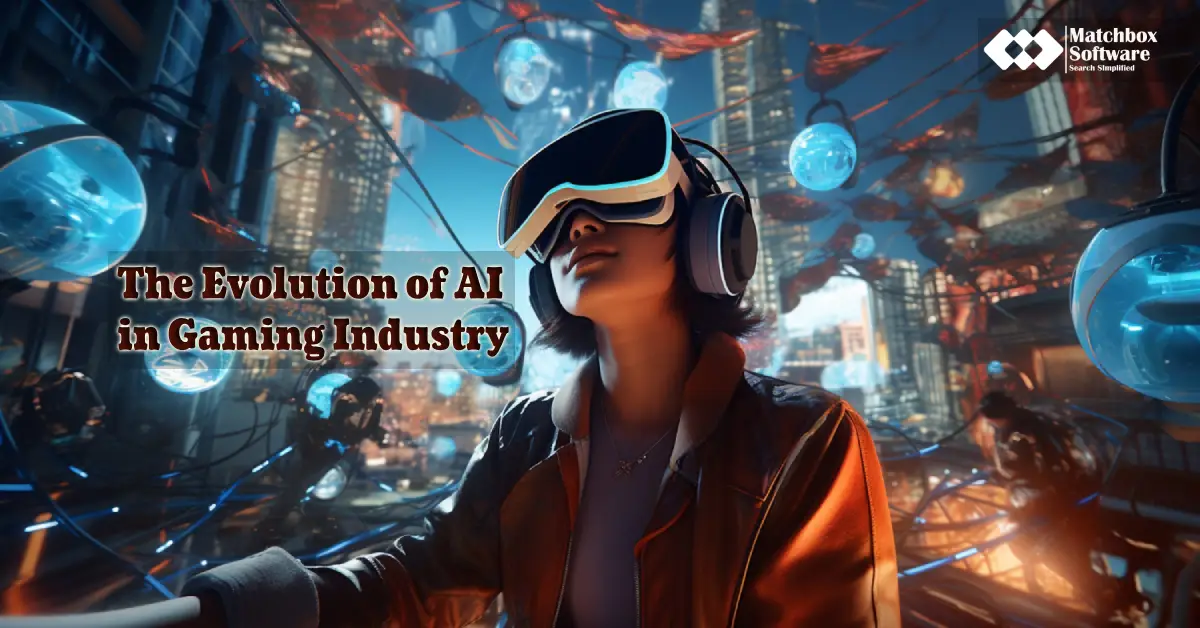Table of Contents
Introduction:
The gaming industry has always been at the forefront of technological innovation, constantly pushing the boundaries of what’s possible. In the evolution of AI in gaming industry, there has been a remarkable transformation from rudimentary decision-making processes exhibited in early arcade games to the sophisticated, lifelike virtual environments and intelligent non-playable characters (NPCs) that define contemporary gaming experiences. From the early days of arcade classics like Galaga to the immersive virtual worlds we explore today, gaming has been a pioneer in incorporating cutting-edge technologies. One of the most significant advancements in recent years has been the integration of artificial intelligence (AI) into video games, revolutionizing the gaming experience in profound ways.
The Evolution of AI in Gaming Industry:
From Galaga to Immersive Worlds
The journey of artificial intelligence in gaming began modestly, with simple decision-making capabilities in arcade games like Galaga. However, In the evolution of AI in gaming industry, we’ve witnessed a fascinating journey marked by continuous innovation and integration. Today, AI plays a crucial role in game development, transforming non-playable characters (NPCs) from mere placeholders into dynamic entities that enhance player immersion and engagement.
Take, for instance, Ubisoft, a leading game developer utilizing AI to facilitate real-time interactions between players and NPCs through natural language processing. But AI’s role extends far beyond dialogue; it now powers complex algorithms that manage vast digital environments, creating lifelike worlds with realistic environmental impacts that would have been inconceivable without AI’s computational prowess.
NPCs and the Future of AI Gaming:
NPCs, once static figures in gaming, have evolved into dynamic entities driven by AI algorithms, capable of adapting, learning, and evolving alongside players. It’s not far-fetched to imagine a future where AI-driven NPCs seamlessly integrate with human players, blurring the lines between virtual and real experiences.
Looking to the future, the evolution of AI in gaming industry promises even more groundbreaking advancements, with AI poised to revolutionize gameplay, storytelling, and immersive experiences in ways we can only begin to imagine.
AI Beyond Gaming:
The potential of AI transcends the realm of gaming, mirroring the personalized recommendations of platforms like Amazon and Netflix by analyzing player behavior. This invaluable data not only informs game development but also influences marketing strategies and monetization models, optimizing the overall gaming experience.
The Rise of AI-Native Gaming Companies:
A significant shift is underway in the gaming industry, marked by the emergence of AI-native gaming companies. These innovators leverage AI to revolutionize gameplay mechanics, enhance graphics, and reshape storytelling. They aren’t just adapting to AI; they’re shaping its future trajectory.
DraftKings: Pioneering AI in Gaming:
DraftKings stands out as a prime example of a company embracing the AI revolution in gaming. Through sophisticated data analysis, DraftKings delivers tailored experiences, predicts outcomes, and keeps players engaged—a glimpse into the future where AI and human creativity coexist seamlessly.
Read More Articles:
Meet Devin AI: The World’s First AI Software Engineer. Should Engineers Worry?
The Road Ahead:
As AI continues to evolve, so too will gaming, ushering in a new era where AI isn’t merely a tool but an indispensable companion in our gaming adventures. So, the next time you immerse yourself in a virtual world, remember that behind the scenes, AI is tirelessly working to elevate your experience to new heights.
As technology continues to advance, the future in the evolution of AI in gaming industry holds the potential for unprecedented levels of realism, player immersion, and personalized gaming experiences, setting the stage for an exciting era of innovation and creativity.
In the gaming industry, the edge lies not just in pixels and polygons but in harnessing the power of artificial intelligence.
Frequently Asked Questions(FAQs):
Here are five frequently asked questions about the evolution of AI in gaming industry,
What role does AI play in modern video games?
AI has become an integral part of game development. It breathes life into non-playable characters (NPCs), making them feel real and encouraging player interaction. Beyond dialogue, AI creates vast digital environments, handles complex data, and simulates realistic effects, enhancing the overall gaming experience.
How are NPCs evolving with AI?
NPCs are no longer static placeholders. AI algorithms shape their behavior dynamically. Imagine a future where AI-driven NPCs adapt, learn, and evolve alongside human players, blurring the line between virtual and real.
Can AI impact gaming beyond gameplay?
Absolutely! Just as Amazon and Netflix analyze customer data for personalized recommendations, gaming AI learns from player behavior. It informs game development, marketing strategies, and even monetization models. AI-native gaming companies are rising, shaping the industry’s future.
What’s an example of AI revolutionizing gaming?
Look no further than DraftKings. They’ve embraced AI to analyze player data, tailor experiences, and predict outcomes. DraftKings exemplifies how AI and human ingenuity can coexist harmoniously, creating exciting and profitable gaming environments.
What lies ahead for AI and gaming?
We’re on the brink of an era where AI isn’t just a tool but an essential companion in our gaming adventures. As AI continues to evolve, so does gaming. The ones and zeros of artificial intelligence hold immense potential for shaping the future of virtual worlds.

